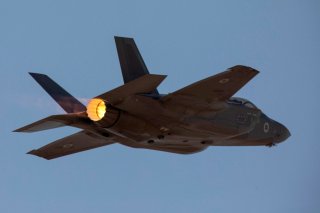As Biden Talks to Iran, Israel Gears Up for War
The Israeli military was refreshing its plans for a strike on Iran to supplement Israel’s current strategy.
Here's What You Need to Remember: Israel has already carried out sabotage and assassinations inside Iran itself to derail its nuclear program, including allegedly bombing the Natanz enrichment facility in July and assassinating top Iranian nuclear scientist Mohsen Fakhrizadeh in November.
Israel is ratcheting up pressure on Iran and the United States as it publicly prepares a military option against Tehran’s nuclear program that would risk triggering a larger regional conflict. On Jan. 25, the chief of staff of the Israel Defense Forces (IDF), Lt. Gen. Aviv Kochavi, said that the Israeli military was refreshing its plans for a strike on Iran to supplement Israel’s current strategy. Kochavi said the IDF would develop the plans over the next year. The IDF reportedly requested $918 million to supplement its annual budget from the Knesset to develop military options for an Iran strike. Israel’s national budget has not been passed, but the supplement was likely to be approved by the security cabinet headed by Prime Minister Benjamin Netanyahu. Kochavi also said that Iran could be months or even weeks away from a bomb, should Tehran attempt a dash for a nuclear weapon.
-
U.S. President Joe Biden’s new administration is preparing to negotiate with Iran over the fate of its nuclear program. This has fueled concerns in Israel that the White House will sign another deal with Tehran that does not address other core issues, such as Tehran’s support for anti-Israel regional proxies (including Hezbollah in Lebanon and Khatib Hezbollah in Iraq) and the status of Iran’s ballistic missile program.
-
Israel is also entering election season in which the Iran nuclear issue will be a major political issue. The general election is scheduled for March 23.
-
Kochavi’s hawkish comments were controversial in Israel’s defense establishment, which is eager to still maintain good ties with the United States, with Defense Minister Benny Gantz saying such comments should be kept behind closed doors. But the comments also did not receive public pushback from Prime Minister Benjamin Netanyahu.
In the hopes of securing a tougher U.S.-brokered deal with Iran, Israel will increasingly signal its readiness to attack Iran to ensure both sides take its demands seriously. Israel has long wanted a more comprehensive deal to address Iran’s position in the Middle East. It primarily wants Iran to be unable to produce a nuclear weapon, but it also wants to reduce or remove the threat of Iran’s ballistic missiles and regional proxies to Israel itself. The United States has been open to these negotiating points, but Iran is, for now at least, less willing to wrap these issues into negotiations regarding its nuclear program.
-
In 2012-13, Israel also signaled a willingness to attack Iran’s nuclear program to pressure the negotiations that led up to the JCPOA. However, despite coming reportedly close to launching airstrikes on Iran, internal opposition from Israel’s defense establishment and concerns about a major diplomatic rupture with the United States prevented such action.
-
Iran sees its ballistic missiles and proxies as necessary deterrents to its ideological and strategic adversaries in Israel, the United States, and Arab Gulf states like Saudi Arabia and the United Arab Emirates. Iran’s conventional military forces are underequipped and widely seen as less credible than its asymmetric forces, which focus on deterring attacks on Iran proper via disruptions to oil exports in the Persian Gulf, missile and rocket attacks on rival military forces and cities, cyberattacks and terrorist cell activity.
If negotiations do not address Iran’s slow drift towards developing a nuclear weapon, further covert or even overt Israeli actions against Tehran’s nuclear program are possible. Israel may be more willing to tolerate Iran’s ballistic missiles and regional proxies, particularly if it’s able to continue its covert war against such threats without disrupting relations with the United States or sparking a regional war with Iran. However, Israel may be more willing to risk a diplomatic breach with the United States over the final status of Iran’s nuclear program, particularly if the March 23 election yields a more hawkish Israeli government that shares Kochavhi’s views.
-
Israel’s conventional military deterrence and anti-missile systems can help offset some of the threat from Iran’s regional proxies like Hezbollah and its ballistic missiles, which would reduce Israel’s imperative to see these threats reduced through negotiation. Israel has been conducting hundreds of airstrikes and covert operations against Iran’s proxies — mostly in Syria, but also occasionally in Lebanon and Iraq.
-
Israel has already carried out sabotage and assassinations inside Iran itself to derail its nuclear program, including allegedly bombing the Natanz enrichment facility in July and assassinating top Iranian nuclear scientist Mohsen Fakhrizadeh in November.
-
Addressing the Iran nuclear program more assertively has become a key campaign issue among the right-wing parties competing in Israel’s next election.
As the U.S. Prepares to Talk With Iran, Israel Prepares a Military Option is republished with the permission of Stratfor Worldview, a geopolitical forecasting and intelligence publication from RANE, the Risk Assistance Network + Exchange. As the world's leading geopolitical intelligence platform, Stratfor Worldview brings global events into valuable perspective, empowering businesses, governments and individuals to more confidently navigate their way through an increasingly complex international environment. Stratfor is a RANE (Risk Assistance Network + Exchange) company.
This article is being republished due to reader interest.
Image: Reuters.

